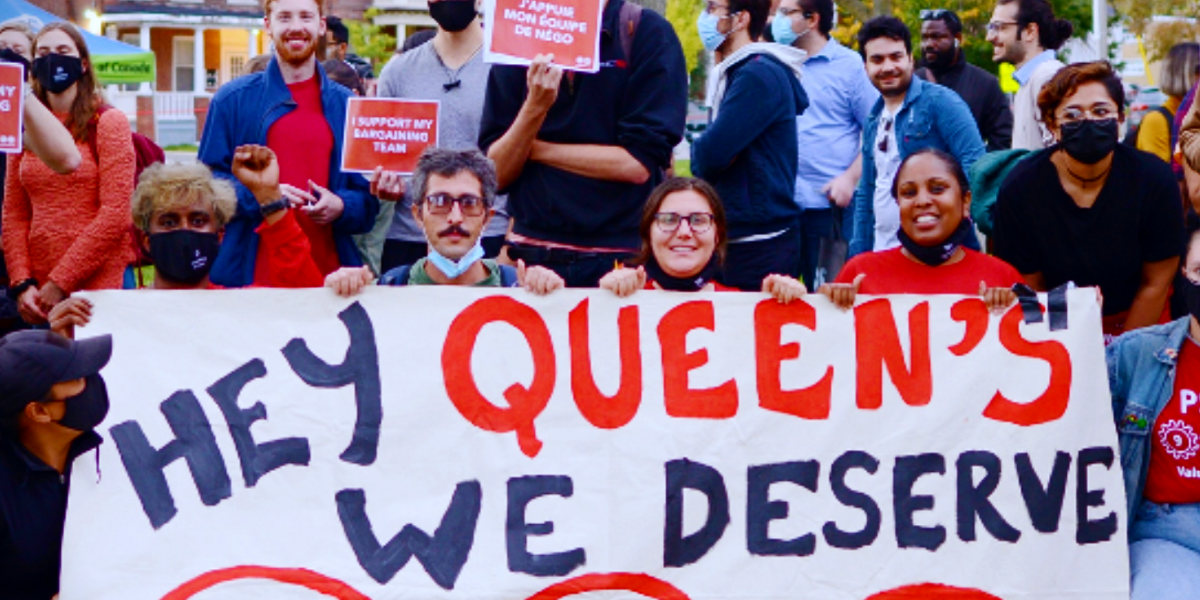Graduate students are in the midst of a cost of living crisis. In response to their university’s lobbying efforts to halt the Ontario tuition freeze, graduate students from Queen’s University at Kingston are organizing to end graduate tuition fees. Under the banner of PSAC 901, the union that represents Queen’s graduate student workers, ‘The Abolish Graduate Tuition Rally’ is taking place on February 7 at 11:00 am at Richardson Hall, Queen’s University campus.
Organizing for affordable education
The upcoming rally is a follow-up from a townhall held by PSAC 901 on January 23 where graduate students expressed their anger and dissatisfaction at the university’s stance. The townhall attendees were met with quite the sight upon entering the venue—a plush toy chicken labelled “Principal Patrick Deane” sat smugly atop a stack of instant ramen noodles. Upon closer inspection, one could see that the ramen packets had messages written on top such as “surviving on ramen at this point”, “pay your TAs and RAs” and “rent=1700, TA pay=1200, how do I survive?”.
This symbolic installation represented Patrick Deane’s “chickening out” or refusal to attend the town hall despite being invited to listen to the students’ pressing concerns. In response to PSAC 901’s letter to the Principal and an invitation to attend, Patrick Deane declined to join with a response that, the town hall attendees pointed out, “sounded like it had been written by ChatGPT” an AI chatbot. As part of the protest, around 300 ramen packets with the messages will be sent to the Principal’s office in a statement making move.
Cost of living crisis
At the town hall, graduate students shared their experiences of living in precarious conditions in terms of housing and food. Due to the closure of labs and archives, many were unable to do any research during the pandemic and hence need more time to complete their programs. One such student in their seventh year mentioned that they work four jobs to pay tuition to the university and to make ends meet, since no funding is in place after the fourth year. Others shared how most students are paying over $1000 a month for housing and around $8000 in tuition fees.
Instead of building more affordable housing, the university is currently refurbishing infrastructure built only ten years ago. This shows the university’s disconnect with the students’ precarity and their unwillingness to take action. Attendees also pointed out that there is no graduate tuition at universities ranked higher than Queen’s outside of Canada, citing examples of Germany and Brazil.
Students struggling with skyrocketing rent and cost of living in Kingston were shocked to learn about the Queen’s Principal Patrick Deane’s active lobbying the Ford Government to bring an end to the tuition freeze. Post-pandemic inflation, the rising cost of fuel at the outset of the Russia-Ukraine war, the increase grocery prices and the rising interest rates have driven up living costs in an unprecedented manner. In particular, the city of Kingston’s housing and rental situation has made it impossible for limited income graduate students to afford decent accommodation. Currently, the monthly median rent in Kingston is $1699 for a 1 bedroom apartment, which is a 22 percent increase since last year. Moreover, food costs in Ontario have gone up by more than 10 percent and is expected to increase at least 7 percent more.
Though Queen’s University has its own community housing for graduate students at a below-market rate, the demand far exceeds the supply. Last year, the Queen’s Community Housing office received over 300 applications for only 60 available housing units in less than half an hour of the application opening. Hence, for a community of graduate students where many are skipping meals, relying on food banks for subsistence, overpaying for cramped housing spaces and dealing with unreasonable landlords, the thawing of the tuition freeze will further jeopardize their ability to make ends meet.
Migrant students
Migrant students often get the brunt of hardships due to rising costs of living. Not only is their status in Canada precarious as is their working conditions, but they also suffer negatively due to inflation in both their home countries and Canada. Students from developing countries and those affected by war in particular have no way to bring in financial support from their families.
Moreover, many currencies have declined in dollar value, rendering international students’ savings useless and of miniscule value in Canada. In such a situation, the sudden increase in tuition fees will push them further into graduate student poverty. The inability to pay tuition fees also renders students’ study permits in Canada obsolete. Many international students face deportation and persecution. Migrant students are often forced to work multiple precarious jobs and accept under-the-table pay from employers.
Fight the fees
The February 7 rally, organized by PSAC 901, is taking place in conjunction with PSAC 610 of University of Western Ontario. The event will bring issues of graduate students earning less than minimum wage, the housing crisis, rising cost of living and food insecurity into limelight. Graduate students across disciplines at both Queen’s University and elsewhere have expressed solidarity with the event.
Did you like this article? Help us produce more like it by donating $1, $2, or $5. Donate


